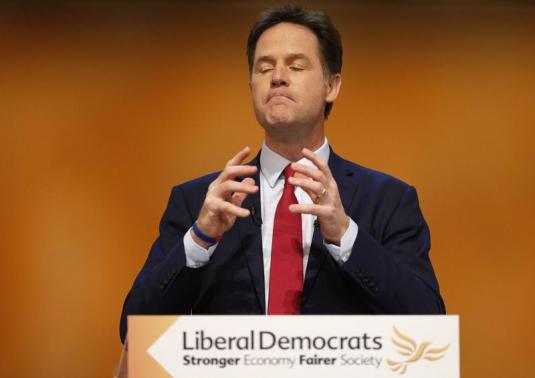
The Liberal Democrats are at risk of becoming the UK’s sixth political party as the Greens release new figures showing their membership has doubled in one year. Nick Clegg’s party has already been overtaken by the Scottish National Party, and UKIP also look likely to become bigger by the time of the election.
Traditionally the Liberal Democrats have been the third largest political party behind Labour and the Conservatives. However, since the the Scottish referendum the SNP have climbed to over 90,000 members dwarfing the Liberal Democrats’ 44,000 members.
Before the referendum UKIP had been expected to become the third largest party because, although they are still behind the Liberal Democrats, their membership is rising rapidly and stands at 40,094. At the current rate of increase, this makes it almost guaranteed that they will surpass the Liberal Democrats in the next few months.
The Liberal Democrats’ disastrous situation has now been compounded by figures showing the Green Party of England and Wales has 27,618 members, double what it had last year. They have also recruited 500 new members in the last few weeks, which they believe is as a result of a successful appearance on BBC Any Questions by their party leader Natalie Bennett.
Natalie Bennett told the Guardian: “This is a real landmark in the Green surge. To have doubled the membership of the party in less than a year is a real marker of the way in which people in England and Wales are seeing that we need real change in our society, not the business-as-usual politics offered by the three largest parties.
“Talking to new members around the country, their reasons, and the trajectories that brought them to the Green party, vary a great deal. There are many former Labour and Lib Dem members who are fed up with parties that are happy to see society continued to be run for the benefit of the 1 percent and the continued trashing of our natural environment.
She continued: “These new members are putting their grassroots efforts and their financial support, as are many other supporters around the country, into making the 2015 general election transformatory. They understand there is a unique opportunity for a peaceful revolution delivered by enthused, energised voters.”
The membership surges by UKIP, SNP and Greens are evidence that large numbers of people are abandoning traditional parties. The popularity of these newer parties is also reflected in the polls with UKIP beating the Liberal Democrats by quite some margin.
Farage’s party have been polling around 15 percent compared to Clegg’s 7 percent. The Green’s are normally one or two percent behind the Liberal Democrats, but with new members coming in this could change.
The SNP do not have a national share of the vote as they only contest Scottish elections. However, they are widely expected to improve on their six House of Commons seats at next year’s election.

COMMENTS
Please let us know if you're having issues with commenting.